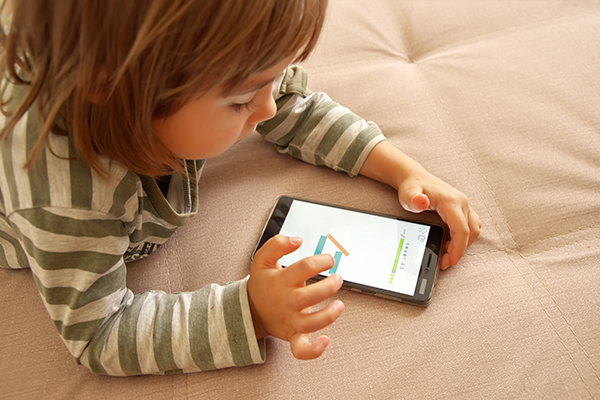
children and mobile phones
The Mobile Dilemma: How Parenting Practices Affect Infant Development”
In the digital age, parents face a growing challenge: balancing the issues of convenience against that fundamental need for their infants. Strategy One tells us how widespread the use of mobile phones as pacifiers or distractors for crying babies, coupled with a transition from touch culture and teaching it. The impacts that this trend jeopardizes baby’s development calls out to our attention
The Mobile Dependency:
On the parents spends times of distress, they mostly give their babies a mobile phone or tablet thinking that it’s quickly going to stop crying and make them soothe. On the one hand, screens come in handy when trailing after a frustrated or highly excited toddler but they also pose multiple issues.
Delayed Development:
Infant’s social, cognitive and emotional development may be impaired by excessive screen time ‘ Moreover, this problem is especially crucial at early ages. Still infants miss opportunities for sensor and intra corporeal learning, which they would otherwise learn from actual interactions while exploring a situation.
Impaired Social Skills:
Continuous screen time stunts the growth of social abilities and emotional intelligence. Infants need human interaction for them to be able to relate well with crying and laughing, emotions as they cannot read facial expressions yet; besides, he can encompass empathy towards others in life.
The Impact on Teaching Culture:
Learning cultural values and behaviors should be an essential part of a child’s upbringing through parental involvement. In teachings or guiding him to these. However, since the change in focus from use of hands for conveying information to usage of mobile devices. As pacifiers during childhood , less time is now being spent on direct personal interaction between parents and their infants.
Loss of Cultural Connection:
Learning about the heritage, language and traditions one primarily learn from direct interaction or experiences of infants. Nowadays, parents may offset the influence and importance of real-world interaction by substituting them with screens.
Missed Learning Opportunities:
The values and behaviors regarding culture are taught through storytelling, singing songs, playing games à nd ‘brushing everyday life within the family. When such parents keep themselves fixed to the mobile devices, however directly these technologies may help them impart human experiences that are immersed completely in culture and thus important for understanding one’s cultural identity as a person of color.

children and mobile phones
Nurturing Healthy Development:
The parents have an integral responsibility in promoting healthy growth and assisting the child to comprehend the world outside him. Instead of relying on screens as a default solution, here are proactive steps parents can take:
1. Engage in Interactive Play:
Make sure that when your baby is still young, to play with him or her using his hand. Dull toys, books and activities are ineffective.’; push the children towards sense stimuli that trigger exploration.
2. Limit Screen Time:
Set strict limits of screen time exposure. American Academy of Pediatrics advises that no screen time be permitted for children under one-and-a half years and limiting accurate exposure to older kids.
3. Embrace Cultural Practices:
Ways to Institutionalize cultural practices. In terms of rationality one must ensure integration and perception of the same element. Several times in a day within their routines. Target children through sharing stories, singing songs, preparing meals according to the traditional diet and organizing celebrations as per their ages.
“Handing children a phone may silence their cries, but it could silence their development too.”
-healwellhub
4. Be Present and Responsive:
When your baby gives cues, start responding as fastly and affectionately as possible using physical comfort not screen distractions immediately. The regard to their emotional well-being in you being around and actively interacting is precious.
5. Model Healthy Behavior:
Children learn by observing. If you own a phone and watch videos, be the one to cut back on your screen time for avoiding or limiting it completely and spending more precious minutes at face-to-face interactions.
Creating a Balanced Approach:
Digital technologies are crucial for balancing technology and traditional teaching practices. On one hand, mobile devices could be great developmental aids if use judiciously but never should they replace the importance of direct parent involvement.
Conclusion:
Possible issues that contemporary parents are facing include the dependence on phone calls as a fast solution for soothing infants. And ousting of time-intensive teaching culture. Whatever the negative impacts may be, it is identified that our society can avoid these implications if we try to recognize such issues and make conscious efforts in order to give a greater preference for personal vis-àvis on line meetings, cultural teachings or practice of some hands activity as infant development factors.
Therefore, a child has formative years. When they grow up and the interactions they have in their early lives could help shape them thus become what is there after. By developing enduring and caring relationships, receiving important teachings of a culture. They belong to, setting boundaries for the use of technologies that tend kids away from nature – parents can create fulfilling space where their infants are building healthy mental blocks by understanding the world closer.
children and mobile phones
Facing Memory loss? Quit these Habits for a Sharper Mind
Memory is the foundation of our memories, connections to others and functioning in general. Big time – However, so many of us encounter moments where we forget something or have memory gaps, especially as we get older. However, luckily there were ways to the better memory and cognitive function and eradicating bad habits that could hinder a keen mind.








Leave a Reply